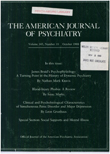A controlled study of methylphenidate in the treatment of attention deficit disorder, residual type, in adults
Abstract
Thirty-seven adult patients meeting the Utah criteria for attention deficit disorder, residual type, were entered into a double-blind crossover trial of methylphenidate and placebo. A moderate-to-marked therapeutic response occurred in 21 (57%) of the patients while receiving methylphenidate and in four (11%) while receiving placebo, a highly significant difference statistically and clinically. The responding patients showed significant improvement in the following areas: attentional difficulty, motor overactivity, affective lability, and impulsivity. The diagnosis of attention deficit disorder, residual type, should be considered in patients with prominent complaints of impulsivity, restlessness, emotional lability, and hot temper who do not suffer from schizophrenia or major mood disorder and do not have symptoms of schizotypal or borderline personality disorders.
Access content
To read the fulltext, please use one of the options below to sign in or purchase access.- Personal login
- Institutional Login
- Sign in via OpenAthens
- Register for access
-
Please login/register if you wish to pair your device and check access availability.
Not a subscriber?
PsychiatryOnline subscription options offer access to the DSM-5 library, books, journals, CME, and patient resources. This all-in-one virtual library provides psychiatrists and mental health professionals with key resources for diagnosis, treatment, research, and professional development.
Need more help? PsychiatryOnline Customer Service may be reached by emailing [email protected] or by calling 800-368-5777 (in the U.S.) or 703-907-7322 (outside the U.S.).



